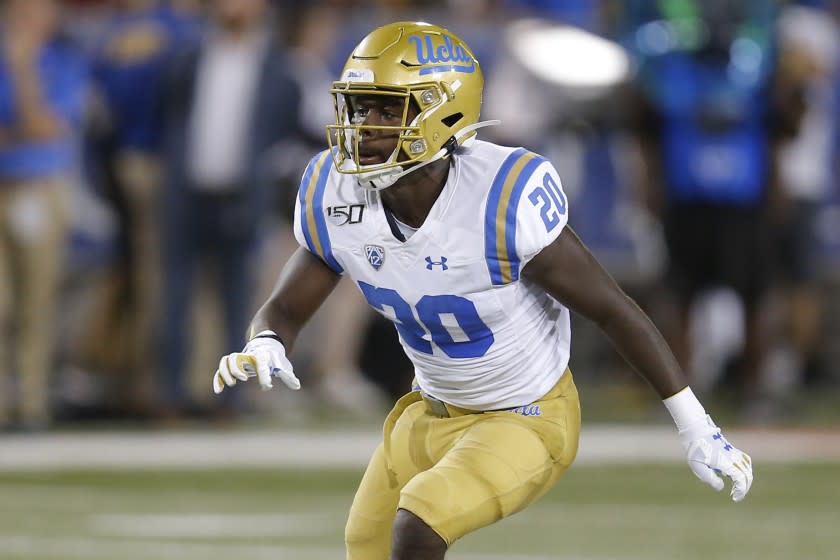UCLA players' work to improve college football won't end even if season does

If plans to salvage fall college football collapse this week, the season either pushed to the spring or canceled entirely, it won’t mark the end of two UCLA players’ efforts to enhance what they see as a game on a different sort of brink.
Elisha Guidry and Otito Ogbonnia say the movement they helped champion to protect Pac-12 athletes amid a once-in-a-century pandemic will endure regardless of whether the next game is played in September, March or August 2021.
“I think the NCAA and some of these conferences have been exposed with the lack of leadership,” Ogbonnia said Monday afternoon during a half-hour Zoom meeting with The Times. “Ultimately, I think that might drive people to do things that have never been done before with college football.”
Ogbonnia and Guidry are part of a group of more than a dozen Pac-12 players pressing the conference for improved safety protections from the novel coronavirus as well as an equitable chunk of the profit pie, threatening to boycott practices and games through the #WeAreUnited movement if their demands aren’t met.
Their concerns have become overshadowed the last few days by a growing cacophony of cancellations. First, the Mid-American Conference said it wouldn’t play this fall, followed by the Mountain West Conference. The Pac-12 presidents and chancellors are scheduled to meet Tuesday to discuss the matter, less than a week before the date the conference had set as a possible start of training camps under optimal conditions.
If there’s no fall football, both Ogbonnia and Guidry said they would be in favor of playing in the spring.
“This amount of time away from football I don’t think is necessarily healthy for anybody, just from an athlete standpoint and a societal standpoint, so I would definitely want their continuing having football in the spring if that was possible and I think it is possible,” said Ogbonnia, a defensive lineman. “We have time to plan for that if that’s the case and hopefully by the spring if there’s a vaccine or the cases go down substantially, it will just be a lot safer regardless of any protocols or guidelines.”
Guidry suggested that playing in the spring would allow Pac-12 officials to meet with counterparts from the NBA, WNBA and NFL to mimic their safety strategies, realizing a bubble environment would not be possible at the college level. But increased, uniform testing should be mandated before the next game, the players said.
“If you can’t procure tests,” Ogbonnia said, “you’re kind of [preparing] for it to be a train wreck this season and nobody wants that.”
The players said the Pac-12 has not responded since they sent a letter to Commissioner Larry Scott, ripping him for the way he handled the initial meeting between the conference and the group of players demanding change. Guidry, a defensive back, said the players’ ask of half of conference revenues remained on the table but had taken a backseat to concerns about COVID-19 and eligibility with the Sept. 26 season opener quickly approaching.
Ogbonnia and Guidry said their pitch to their teammates was that even though they may not agree with every aspect of the players’ demands, their efforts were intended to improve college sports and “just having the conversation was going to be beneficial in the long run for everyone.”
Guidry said there was no disconnect between the #WeAreUnited and #WeWantToPlay movement that emerged after the threat of widespread cancellation became imminent over the weekend.
“It’s not like we don’t want to play,” said Guidry, a defensive back. “We just want to play safe. There’s a lot at risk, especially amid a pandemic when the numbers are actually higher than when we stopped doing spring ball.”
Guidry and Ogbonnia said no UCLA players had opted out of the season as a result of safety concerns but acknowledged that may be in part because players are waiting for eligibility issues to be addressed should they choose not to play.
If the season gets pushed back to the spring, both players said they would remain on campus instead of returning home because it offered a safer environment. Nobody on the team has tested positive for COVID-19 since the last wave of players arrived on campus in early July.
“I feel like if schools were to keep their teams at school, you kind of can be able to look out for them and they’ll be able to work out in the facility and you can kind of control that environment,” Guidry said. “That’s one of the good things about just being at school is it’s kind of like your own bubble, so you can set things like workouts, you can have your team social distance when away from the facility.”
While the players acknowledged the stress of their season being in limbo, they said they had mentally prepared themselves for the outcome to go either way.
“You’re like on the edge of your seat in a movie, the climax is coming,” Guidry said. “You’re always on your toes expecting the next big thing.”

